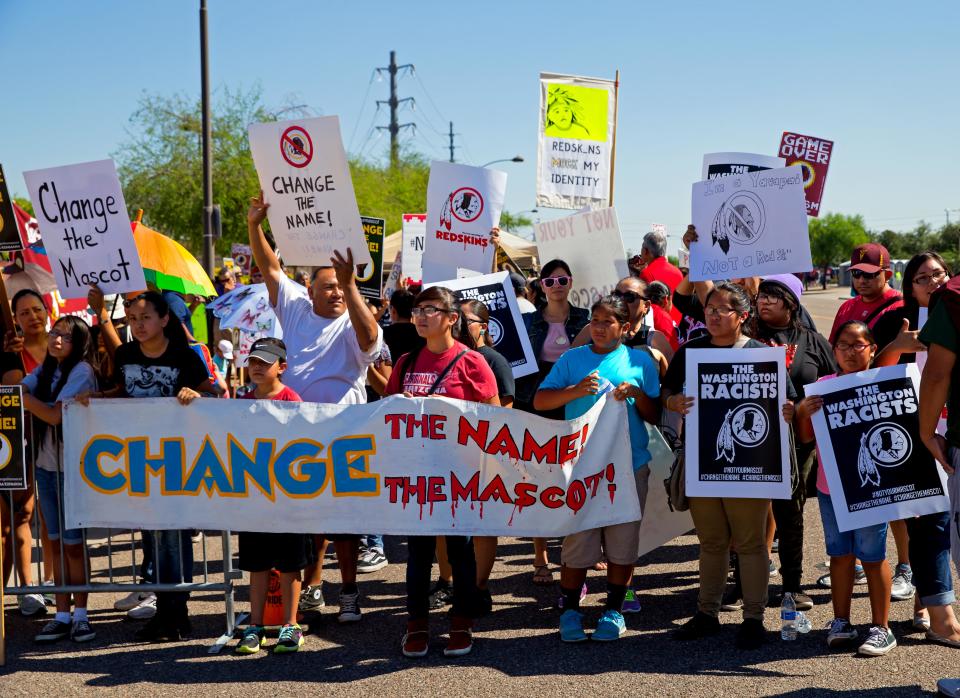Opinion: New Nielsen poll offers hope that we'll 'see the end of Native mascots'
Crystal Echo Hawk, the founder and executive director of IllumiNative, which fights negative stereotypes of Indigenous peoples, has hope. She has hope that one day, the use of Native people as mascots will end.
Her hope is justified by a new and important Nielsen survey, provided to USA TODAY Sports, that shows a large swath of younger Americans see the use of Native people as mascots as wrong.
The Nielsen mascot survey is one of the most comprehensive, but also one of the most important, because it shows that younger people are understanding the name is an offensive slur.
And if they understand that it means a future where Indigenous peoples aren't caricatured is that much closer.
"Conditions are finally changing," Echo Hawk told USA TODAY Sports. "We’ve already started to see major shifts in the way Native Americans are seen. These findings show that young people already understand the harm that’s caused by these mascots. We believe that much of the support for mascots stems from miseducation and ignorance. Americans have been misled about the true harm these mascots cause Native people, particularly Native youth. Through more education and a positive, accurate representation of Native people, we’re confident the support to end the use of these mascots will grow. We will see the end of Native mascots, it’s not a matter of if, but when."

She added: "As a Native person and as a mother, it’s always hard to see results that show we’re not finished with an issue that has affected our community for too long. Every day we see and feel the impact of these mascots. Either through increased discrimination and violence against Native peoples, or higher rates of mental health issues among Native youth. But we still have hope. We were told the Washington Football Team would never change their name. The same for Cleveland. More people today understand the harm these mascots cause our children than ever before. I’m hopeful in my lifetime we’ll see the end of them."
Over the past few years various high school, college and professional teams have either ended outright, or issued some type of partial ban of the use of these mascots. One of the most notable was the Washington Football Team which dropped the racist nickname "Redskin."
MORE: Cleveland not allowing headdresses, painted faces at MLB games
MORE: 'Cotton Pickers' latest battle in team mascot debate across sports
One part of the Nielsen survey showed that younger people increasingly don't believe that Native mascots are meant to honor. The trope that such mascots honor Native people has been the belief of pro-Native mascots for decades, while Native activists and studies say they cause immense psychological damage.
According to Nielsen, 30 percent of people ages 16-20 see Native mascots as honoring, and 44 percent of people ages 21-34. That's a far smaller number than people aged 35-54 (62 percent) and 55-69 (49 percent).
Overall, 46 percent of respondents said they supported the removal of racist mascots, and 45 percent felt the mascots were harmful to Native people.
"I’d characterize the research findings as encouraging," said Stacie de Armas, the senior vice president of diverse insights and initiatives at Nielsen, to USA TODAY Sports. "The findings showed us that fans across pro sports agreed that appropriating Native American heritage or culture as mascots is harmful. And a full 45% of fans want sports teams to do more than just stop using culturally insensitive mascots and names. They want them to end the appropriation of Native American culture.
"This demonstrates progress on the journey towards racial equality for American Indian and Alaska Native people who have been working to bring an end to negative and harmful stereotypes in media and pop culture, including in sports. We are encouraged, because the movement has momentum and fans are behind it with nearly half of respondents saying teams are doing the right thing by changing their names and stopping the use of culturally insensitive mascots."
Overall, one thing seems clear. Things are changing for the better when it comes to the views about Indigenous people as mascots. More people, especially younger ones, see the mascots for what they are: dangerous caricatures that do real damage to actual human beings.
"As America continues its racial reckoning, people are demanding more transparency and accountability from politicians, government, brands, media - and major and minor league sports are no exception," said de Armas. "Fans are driving these conversations, and they’re increasingly expecting and asking brands to have a point of view when it comes to racial or social justice. Fans want to align themselves and their dollars around shared values. And views on appropriation of Native culture is no different. These findings are important because they can serve as a catalyst for brand conversations around who they partner with and how they can authentically respond to calls for social change.
"Nielsen Fan Insights shows that sports fans are 13% more interested in aligning with brands that help fight racial inequality compared to the general population, and 11% more likely to support brands that engage the local community to fight racial inequality. With public expectations growing for rights holders and brands to have an opinion, social causes need to be part of an organization’s overall business strategy."
This article originally appeared on USA TODAY: Native American mascots: Poll shows 'we will see the end' of them

